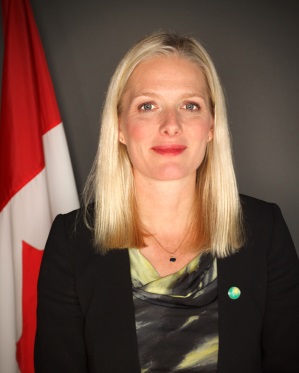Archived: Departmental Plan 2017 to 2018 report, Environment and Climate Change Canada, chapter 1
Minister’s message

Minister of Environment and Climate Change
As the Minister of Environment and Climate Change, I am pleased to present the 2017-18 Departmental Plan.
Our 2017-18 Departmental Plan provides parliamentarians and Canadians with information on what we do and the results we are trying to achieve during the upcoming year. To improve reporting to Canadians, we are introducing a new, simplified report to replace the Report on Plans and Priorities.
The title of the report has been changed to reflect its purpose: to communicate our annual performance goals and the financial and human resources forecast to deliver those results. The report has also been restructured to tell a clearer, more straightforward and balanced story of the actual results we are trying to achieve, while continuing to provide transparency on how tax payers’ dollars will be spent. We describe our programs and services for Canadians, our priorities for 2017-18, and how our work will fulfill our departmental mandate commitments and the government’s priorities.
These new reporting mechanisms make it easier for you to follow the Department’s progress as it delivers on the priorities that the Prime Minister outlined in his mandate letter to me.
My overarching goal is to implement Canada's vision for a clean, innovative economy that embraces both economic growth and environmental protection. The Government of Canada believes that these goals go hand-in-hand.
We see climate change as one of the greatest challenges and opportunities of our time. We are steadfast in our commitment to find solutions to climate change with the ambition and purpose to create a better future for our children and grandchildren. My highest priority is ensuring national leadership to reduce emissions, tackle climate change and price carbon pollution.
Canada remains firm in our commitment to implement the Paris Agreement. The recent 22nd Conference of the Parties meeting in Morocco demonstrated once again that action on climate change goes well beyond national governments. We all need to continue to get involved. More and more businesses for example are taking climate action as they recognize the opportunity that comes from a low-carbon economy. The 21st century will be the clean-growth century. Global demand for clean technology is growing quickly. Canada will provide leadership in global efforts to reduce greenhouse gas emissions, while taking advantage of new opportunities.
Our actions at home will build on the commitments under the Pan-Canadian Framework on clean growth and climate change - the framework is the result of an agreement reached at the First Ministers’ Meeting in December 2016. It is based on partnerships with not only the provinces and territories but also with Indigenous leaders, and draws on broad consultation with the Canadian public and with stakeholders. The Pan-Canadian Framework will help us transition to a stronger, more resilient and low-carbon economy and identifies actions that will allow us to meet or exceed our greenhouse gas emissions reduction target. Our plan is built on four pillars: pricing carbon pollution; taking action to reduce emissions in each sector of the economy; adapting to climate change; and supporting clean technologies, innovation and jobs. Over the coming months, the Government of Canada will also be releasing additional elements of its actions under the Pan-Canadian Framework, intended to achieve our commitment of reducing greenhouse gas emissions by 30% below 2005 levels by 2030.
Our decisions to prevent pollution and conserve species and habitat will continue to be guided by traditional knowledge and the best scientific advice available. ECCC will continue working closely with Indigenous and Northern communities, many of which are on the front lines of climate change. We will build stronger relationships with Indigenous Peoples and strengthen our ability to understand environmental problems and potential solutions.
In 2017-18, we will continue to develop and implement recovery plans for species at risk in a timely and responsible manner. The Department will continue taking action to protect sensitive ecosystems and the biodiversity essential to a healthy environment, and will implement significant new protected areas, such as the Scott Islands Marine Wildlife Area.
Continuing to work with partners to improve the health of Canada’s freshwater ecosystems, including through continued water quality monitoring and research and restoration and pollution remediation activities. We will likewise continue to address environmentally hazardous substances through the Chemicals Management Plan.
With new technologies at its disposal, the Department will build on its work to advance the accuracy and timeliness of weather reports and advisories, enhance climate information, and provide health-related weather information so that Canadians may make informed decisions regarding their health and safety.
I am proud of the progress we made over the past year and there is much to look forward to in the months and years ahead. I, therefore, invite you to read ECCC’s Departmental Plan for more information on how we plan to deliver our priorities for 2017-18 while taking Canada on a path to a cleaner and more prosperous future.
_________________________________________
The Honourable Catherine McKenna, P.C., M.P.
Minister of Environment and Climate Change